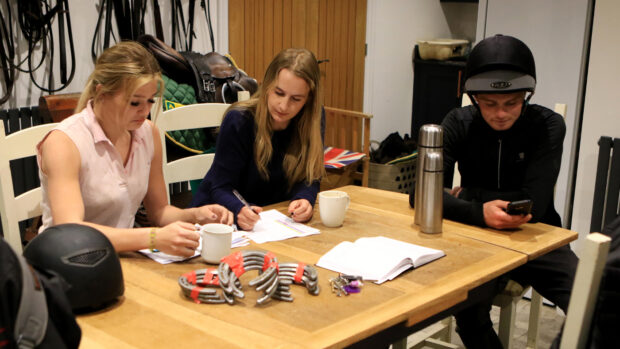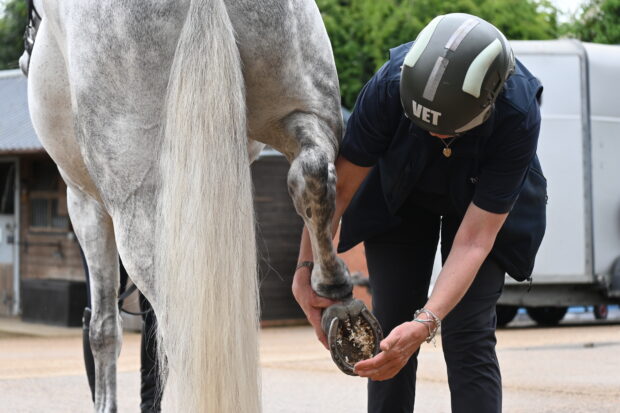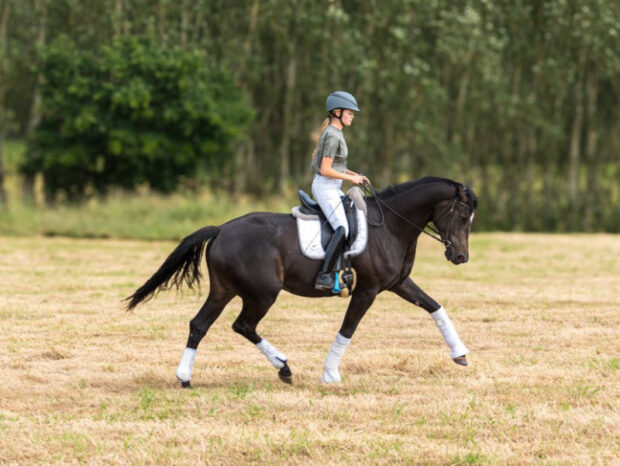Online abuse directed at vets has been highlighted by new figures – as a study looking at suicide preventive measures in the veterinary workplace is launched.
New figures released by the British Veterinary Association (BVA) have highlighted that online abuse remains a concern across the veterinary industry. Of 99 equine vets who took part in a BVA survey, 30% said they had received online abuse, and 47% of 104 equine vets surveyed had felt intimidated by a client’s language. BVA has since launched the “Respect your vet team – end abuse” campaign, encouraging all animal owners to “think before you type” and consider the impact harassment, trolling and unfair reviews can have.
Mental health campaigner and Equicall equine vet Danny Chambers runs the Facebook support group Veterinary Voices UK – a private group for vets founded in 2017 with fellow vet and mental health advocate Sarah Brown who died later that year – and told H&H online abuse of vets happens “all the time”.
“Members in the group used to share screenshots of someone trolling their practice or their own page. But it happened so often we had to stop these being shared because it became demoralising and was bringing everyone down,” he said.
“Online abuse is a double whammy; for many being a vet is not just a job, it’s sort of their whole identity. When you’re getting complained about it’s not just a case of ‘you’ve done a bad job’, they see it as an attack on their very being. And the other side is that feeling of how many people saw the post, or how many agreed? If you’re nervous or lose your confidence you’re not going to do as good a job and it can generate anxiety of being called out to that client again”.
Mr Chambers, who is also a Royal College of Veterinary Surgeons council member and a trustee of charity Vetlife, added that this does not mean genuine client complaints should not be made.
“If there’s a genuine complaint then we can take it on board and improve,” he said. “But there’s a difference between that and someone saying you’ve deliberately done a terrible job and ripped them off, and then a load of people you’ve never met piling on and agreeing.
“Once something goes on social media, often the whole story has changed and a vet can’t go on and reply because we’re not allowed to break GDPR rules and we can’t share clinical notes, so you’ve got to sit there and let it play out. It’s hard to get away from, especially if it’s directly on your own social media.”
IN 2020 H&H reported that mental health in the veterinary industry was “getting worse”, as depression and suicide remained major concerns (news, 19 Nov 2020), and studies have shown vets are at higher risk of serious psychological stress and suicide.
Mr Chambers said suicide in the profession is mutifactorial, but it is important to be clear that client complaints are not being blamed for vets committing suicide. But he said some owners could be more understanding.
“If someone rings at 11pm and you haven’t been to them before and they become angry because you don’t know where their place is or they say another vet usually sees their horse and ‘it’s not good enough’, how are they going to get the best out of someone who might be a new graduate, or doesn’t know the area? It’s that kind of thing that can make what is already a stressful job more stressful,” he said.
Former British Equine Veterinary Association president and Rossdales vet Lucy Grieve agreed with Mr Chambers and said it is about people “being human, and being kind”.
“I don’t think we as vets deserve special treatment, everybody is spinning 10 plates in all walks of life, but it’s just appreciating there’s a lot going on in this kind of job and we’re all human beings,” she told H&H.
“I can think of vets who have been intimidated in person, and I would say that goes on more with equine vets because we’re often on a yard on our own with no one around us on our side.”
Ms Grieves added that because of the nature of the job, equine vets do not get much time to process incidents between calls.
“You can’t just go and have a cup of tea and someone else will take your next consult for you. You’ve got to get back in the car and put on a brave face for the next person,” she said.
“It’s nice when someone appreciates you might be having a bad day or you’re running late, and asks, ‘Are you ok?’ That could make a huge difference to somebody. Showing a bit of kindness and someone recognising you as a human with feelings is all it takes sometimes to pick you back out of that frame of mind.”
THE University of Edinburgh has launched a new project, funded by the university’s business school and veterinary employers across the UK, looking into suicide preventive measures within veterinary workplaces. The work will involve interviewing people who have been affected by veterinary suicide with the aim of understanding how it can be prevented, following which findings will be used to suggest and implement new safety regulations.
Lead researcher Rosie Allister, who is also the Vetlife helpline manager, told H&H when discussing veterinary suicide, an important factor to consider when an occupation has elevated suicide rate is “access to means”; workplace access to methods of suicide. This factor will be looked at in depth in the study.
“This is important to understand because while we know that generally in suicide prevention doing things to make access to means more difficult is effective and reduces deaths, there are things that make that more complicated in vets, including animal welfare considerations and unintended consequences of restriction which might in themselves increase risk,” she told H&H.
“To better understand this we are trying to explore things that influence methods used in suicide attempts, and also how people feel about restrictions of access to means in veterinary workplaces.”
The project will also look at the experiences of those who have lost a veterinary professional to suicide, which have not been included in research before – and the experiences of veterinary professionals who have been suicidal and come back from this. The research is expected to conclude in December, following which the results will be published.
Dr Allister said there are many factors that can influence mental health among vets. These can include unsociable working hours and working on call making home life difficult, burnout, compassion fatigue, the impact of disciplinary procedures, staffing pressures, and the change of expectations on vets.
“We know it can be really difficult for vets to ask for help, and like many people working in rural areas or working in jobs with long hours, it can sometimes be really hard to access help too,” she said.
“Vetlife helpline provides confidential support to everyone in the veterinary community. It is available 24 hours a day, every day of the year. When vets and vet nurses haven’t been able to get help for their mental health we can refer them to our professional Vetlife health support service which can do an assessment with them within five working days, and can help make a plan.”
For any veterinary professional seeking help, Vetlife can be contacted in confidence on 0303 040 2551 or at vetlife.org.uk.
You might also be interested in:

Vets’ mental health a major concern

Brexit ‘disaster’ and Covid make vet-shortage situation worse

Subscribe to Horse & Hound magazine today – and enjoy unlimited website access all year round
Horse & Hound magazine, out every Thursday, is packed with all the latest news and reports, as well as interviews, specials, nostalgia, vet and training advice. Find how you can enjoy the magazine delivered to your door every week, plus options to upgrade your subscription to access our online service that brings you breaking news and reports as well as other benefits.





